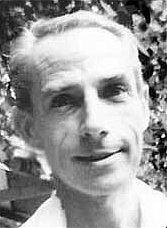Satprem = Bernard Enginger

Bernard Enginger (30.10.1923 – 09.04.2007), Frenchman, disciple of the Mother. He was born in Paris. Breton was his calf-country.
During II World War was Gaullist. In late 1943 was arrested by Gestapo. One and a half year was at death camps.
After the War worked at colonial administration of Pondicherry. Visited one of the Darshans at Ashram. Then travelled at Guiana, Brasilia, Africa. All over he carried “The Life Divine” by Sri Aurobindo.
In 1953 returned to Pondicherry and settle in the Ashram. There he taught at the school, and was in charge of the French issues of “Bulletin of Physical Education”. On 3 March 1957, The Mother gave him the name Satprem (“the one who loves truly”).
Then tripped once more — Congo, Brasilia, Afghanistan, Himalayas, New Zealand, sailed round the world. In 1959 he was a disciple of Tantric, priest of temple in Ramesvaram. Then he was a disciple of another Yogi and wandered at India six months as a mendicant sanyasi practicing Tantra, which formed the basis of his second novel, Par le Corps de la Terre, ou le Sanyassin (By the Body of the Earth or, The Sanyasi).
In 1960 he returned again (as he put it, “the bird flew back once more”), to the Pondicherry Ashram and the Mother, who started inviting him from time to time to her room, originally for work in connection with the Bulletin. As their relationship developed, he asked more questions, and eventually decided to record their conversations, taking a tape-recorder to her room. The result of this collaboration was The Agenda, the first volume of which (which covers 1951 to 1960) also contains Satprem’s letters to The Mother during his wandering days
Also, under The Mother’s guidance he wrote Sri Aurobindo, ou l’Aventure de la Conscience (Sri Aurobindo, or the Adventure of Consciousness), which became the most popular introductory book to Sri Aurobindo and The Mother (published 1964). In 1972 and 1973 he also wrote under the Mother’s guidance the essay La Genese du Surhomme (On the Way to Supermanhood), which she regarded very highly. This was published in 1974.
In 1978 — Mother’s centenary year — the Ashram trustees ‘expelled’ Satprem because of his wish to publish, unexpurgated, the entire transcript of his talks with the Mother. Satprem described this period at his Notebooks of an Apocalypse. All of Satprem’s correspondence from 1962 to 1973 with the Mother was confiscated, and he went (secretly carrying away the tapes of the Agenda) to Harwood, Nilgiri, where he edited the 13 volumes of the Agenda, while at the same time wrote the trilogy Mère (Mother) — Le Matérialisme Divin (The Divine Materialism), L’Espèce Nouvelle (The New Species), La Mutation de la Mort (The Mutation of Death) — both a biography of the Mother and his own analyses and commentary on the Agenda material.
 In 1982 all 13 volumes of the Agenda were published in French by the Institut de Recherches Evolutives (Institute for Evolutionary Research) in Paris. And Satprem felt he had completed all his external work. The following year, he and Sujata decided to withdraw completely from public life for sadhana.
In 1982 all 13 volumes of the Agenda were published in French by the Institut de Recherches Evolutives (Institute for Evolutionary Research) in Paris. And Satprem felt he had completed all his external work. The following year, he and Sujata decided to withdraw completely from public life for sadhana.
The 1985 book La Vie sans Mort (Life without Death) is a follow-up to Mind of the Cells, co-written with Luc Venet, and provides a glimpse of Satprem in his post-Ashram life in this period.
In 1989, he wrote a brief autobiographical account, The Revolt of the Earth, in which he took stock of Man’s present situation. Evolution II followed three years later, a pithy record of Satprem’s journey through our human and terrestrial grave: “After Man, who? But the question is: After Man, how?”
In 1994, Satprem published Lettres d’un Insoumis (Letters of a Rebel), two volumes of autobiographical correspondence.
In 1995, he wrote La Tragédie de la Terre - de Sophocle à Sri Aurobindo (The Tragedy of the Earth - from Sophocles to Sri Aurobindo), which traces a curve from the Vedic and pre-Socratic era to our Iron Age and to Sri Aurobindo.
In 1998, he pulished La Clef des Contes (The Key of Tales).
In 1999, he wrote Néanderthal Regarde (Neanderthal Looks On), an essay on the betrayal of Man in India as in the West, and started publishing his multi-volume Notebooks of an Apocalypse, the record of his work in the depths of the body consciousness, in which he was brutally plunged after Mother’s departure in 1973. In French, seven volumes of Notebooks were published to the date, in English — only vol.1, 1973-1978.
In 2000 followed La Légende de l’Avenir (The Legend of the Future).
In 2002 followed Mémoires d’un Patagonien - Conte Préhistorique et Posthistorique (Memoires of a Patagonian - Prehistoric and Posthistoric Tale) and La Philosophie de l’Amour (The Philosophy of Love).
In 2008, the IRE published his last book L’Oiseau Doël (The Doël Bird).
On 9 April 2007 Satprem leaved his body at the age of 84. About last days of Satprem and Sujata see Nirmal Singh Nahar (elder brother of Sujata Nahar). On Satprem and Sujata: An Interview By Anurag Banerjee.
